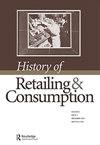Against the dictatorship of rationality. Austerity and consumption in Italy during the seventies
Q2 Arts and Humanities
引用次数: 0
Abstract
ABSTRACT Consumption is always subjected to discursive strategies, and hierarchised to influence the behaviour of citizens: productive and unproductive consumption (J. S. Mill), efficient and inefficient consumption (A. Marshall); these classifications may be designed for moral, economic, and political purposes, in order to set specific boundaries to people’s behaviour in the private sphere, which in turn heavily influence public action, too. During the Seventies, while Italy was marked by an energy crisis and political unrest, the political ruling classes formulated a particular rhetoric of sacrifices and austerity: a common effort of the nation was necessary to solve the economic crisis. The rhetoric of rationality was a political tool promoted by economic elites and various political groups, which were motivated by different reasons. Women were an important part of this discourse, since they were depicted both as big spenders and as the nation’s savers. Another famous opposition to this rhetoric was promoted by left-wing movements, a heterogeneous universe: in some cases, irrationality was promoted as a revolutionary behaviour. This article, after a brief introduction to the Italian context and to the outbreak of the oil crisis, focuses on how the concept of rationality was used to justify specific moralities and behaviours or to delegitimise certain social and political subjects.反对理性的独裁。七十年代意大利的紧缩和消费
摘要消费总是受到话语策略的影响,并被分为层次来影响公民的行为:生产性和非生产性消费(J.S.Mill),高效和低效消费(A.Marshall);这些分类可能是为了道德、经济和政治目的而设计的,目的是为人们在私人领域的行为设定特定的界限,而私人领域的活动反过来也会严重影响公共行动。在20世纪70年代,当意大利面临能源危机和政治动荡时,政治统治阶级制定了一种牺牲和紧缩的特殊言论:解决经济危机需要国家的共同努力。理性修辞是经济精英和各种政治团体推动的一种政治工具,其动机各不相同。女性是这场讨论的重要组成部分,因为她们既被描绘成挥金如土的人,又被描绘成国家的储蓄者。对这种言论的另一个著名反对是由左翼运动推动的,这是一个异质的世界:在某些情况下,非理性被宣传为一种革命行为。本文在简要介绍了意大利的背景和石油危机的爆发后,重点讨论了理性的概念是如何被用来为特定的道德和行为辩护或剥夺某些社会和政治主题的合法性的。
本文章由计算机程序翻译,如有差异,请以英文原文为准。
求助全文
约1分钟内获得全文
求助全文
来源期刊

History of Retailing and Consumption
Arts and Humanities-History
CiteScore
0.50
自引率
0.00%
发文量
3
 求助内容:
求助内容: 应助结果提醒方式:
应助结果提醒方式:


